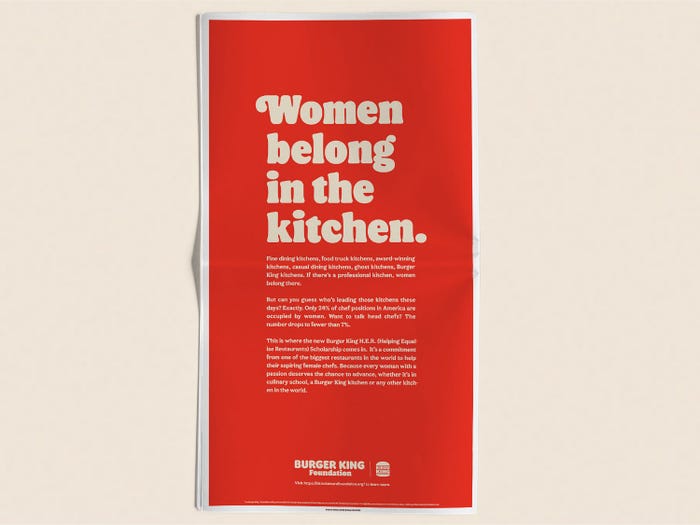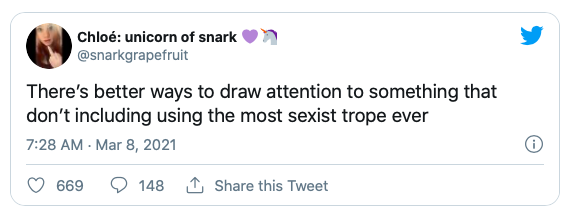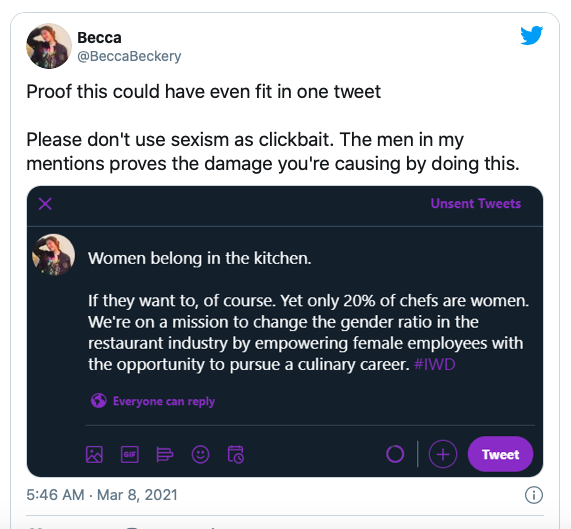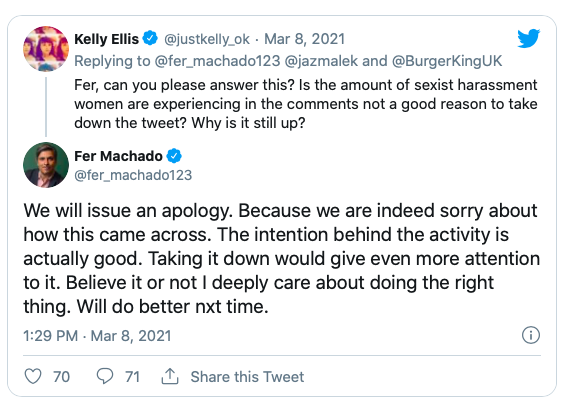Going too far

Burger King got in hot water this week for this International Women’s Day ad.
If you can’t be arsed to read the copy it explains that most professional kitchens are led by men, so BK wants to address that imbalance with a female-centric recruiting initiative.
Under many other circumstances they might have been lauded for this provocative headline that enticed people to read about their effort to combat a sexist situation, but this was International Women’s Day 2021, a time to tread very carefully, so no matter how well intentioned or ultimately ‘helpful’ this headline might have been, it was also tone deaf, cloth-eared and click-baity.


And a reverse-Twitter pile-on followed, with the women who pointed out the cloth-eared-ness receiving sexist vitriol from some stupid men. So, inevitably, BK eventually admitted their mistake and removed the Tweet, while continuing to defend the initiative itself:

I find this interesting because I fully believe Burger King, from its Mouldy Whopper to its nice soft rebrand, is looking to become the nice guy of the fast food market. And they’ve done a good job of that thus far, with provocative ads that are underpinned by a consistently positive brand intention.
But they got this one wrong. And when you’re trying to be provocative, that can happen. Unfortunately, you don’t know how far you can go until you’ve gone too far, and that is what BK did. They went a touch too far on the provocation they thought would be required to get this ad and its initiative noticed. But working out the position of that line, even when it is constantly in motion, is an essential part of the job.
Back when I started at AMV I was given a range of Sainsbury’s ads to write. One brief explained that they did not sell bruised bananas, so I came up with a very provocative headline: ‘Sainsbury’s believes that it is right to discriminate on the basis of skin colour’. But you’ve never seen it because the only people (until now) who knew about it were me and my then-art director. We didn’t tell anyone else because we knew it was a wrong ‘un, whose correct destination was the bin. Even in 1998 it would have caused quite the shitstorm, and rightly so, but it would never have run because even if we”d shown it to our boss and he’d been insane enough to approve it, too many other people would have killed it before it reached the public.
I’m sure we’ve all thought of ideas, visuals and headlines that have walked that fine line between ‘provocative enough to be noticed’ and ‘too far – here come the pitchforks’. I recall an ad in the 1990s where a hostage was returned at a checkpoint. He was bundled into the back of his rescue car, whereupon he got all relieved that he could feel its lovely upholstery. (I just found the Campaign article about it, headlined: The expensive ad that was a lesson in bad taste – Both APL and Rover refused to see that hostages do not sell cars.) But I doubt the people involved were attempting to make a big ad for a boring car that would be incendiary enough to get banned. They just got the line wrong.
So it happens, and it’s clearly not a new thing. On one side the BK headline was obviously a bit too much for a lot of people, but on the other, many would say that the work our industry produces is too bland. And in the current world of social media, brands are even warier about putting anything out there that might scare the horses (unless they’re Brewdog, or anyone else who makes gratuitous provocation an essential element of their communications). The consequences are now too great, and the odds of crossing the number of Twitter accounts required to start a backlash are growing by the day. People understand social media gives them the kind of agency they did not have even ten years ago. Wielding that new power can offer quite a buzz.
So I guess Burger King needs to read the Twitter room a little more accurately next time, but I hope this incident doesn’t put them off future attempts at provocation.
We need to make stuff that gets noticed; it’s one of the fundamental parts of the job, and it’s becoming rarer because ‘too far’ is now in the eye of an increasingly unpredictable, noisy and powerful beholder.
The fact that anyone gets offended by this just makes me want to weep.
Burger King should have told the whingers to f*ck off.
It was perfectly obvious that they were trying to hook people in and flip it. That’s the foundation for a zillion films and stories.